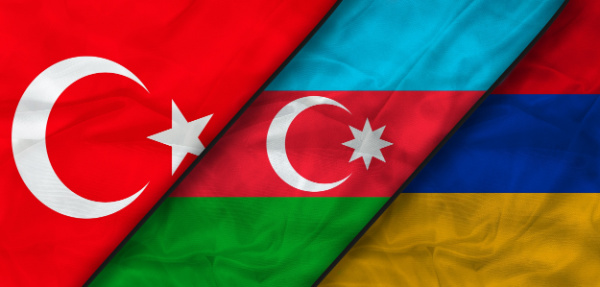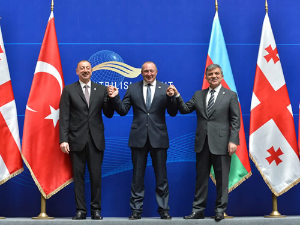Peace with Armenia Will Further Pan-Turkic Ambitions
By Barçın Yinanç
November 9, 2023
A peace settlement in the Caucasus provides a huge window of opportunity for the realization of the Middle Corridor. Turkey needs to strike the right balance in its relations with Armenia and Azerbaijan while neutralizing the disruptive influence of Iran and Russia. Turkey, whose military backing has been decisive in Azerbaijan’s victories in Nagorno-Karabakh, needs to convince its close ally that it’s in their common interest that Armenia is rewarded for its policies, and that inaction could prove costly for regional peace and pan-Turkic ambitions.

A Collective Security Alliance Takes Shape in the South Caucasus
By Micha’el Tanchum (vol. 7, no. 17 of the Turkey Analyst)
The defense ministers of Turkey, Azerbaijan, and Georgia conducted their first trilateral summit in mid-August, adopting specific measures to regularizetheir defense cooperation. Ankara’s participation in the nascent South Caucasus collective security alliance is motivated by Turkey’s ambition to become a leading Eurasian energy and commercial transportation hub and its need therefore to secure the Trans-Anatolian Natural Gas Pipeline and the Baku-Tblisi-Kars railway by providing a credible deterrent against increasing Russian interference in the region.

The "Eastern Dimension" in Turkish Foreign Policy Grows
By M. K. Kaya (vol. 2, no. 18 of the Turkey Analyst)
Although uncertainty and complications remain, the agreements signed between Turkey and Armenia indicate the potential in expanding Turkey’s possibilities of access to the Caucasus and Central Asia. Furthermore, the cooperation agreements that have recently been signed among Turkic states are destined to eventually have far-reaching cultural, economic and political repercussions. But in these, a leading role is increasingly taken not by Turkey but by Kazakhstan and Azerbaijan.
Turkey and the Georgia War: a Bungled Stability Initiative
By M. K. Kaya and Svante E. Cornell (vol. 1, no. 12 of the Turkey Analyst)
Like most other states, Turkey was hard pressed to respond to the war in Georgia. For Turkey, the war threatened its position in the Caucasus, as well as its long-term objective of becoming a hub of European energy transportation. Prime Minister Erdogan chose to moment in order to promote a form of Caucasian alliance - a well-intentioned but somewhat surreal proposal in the middle of a raging war. The crisis exposed the government's lack of attention to the Caucasus, and the need for a serious rethink of Turkey's role there



